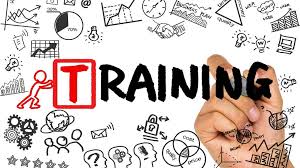Maximizing Potential: Unlocking Success Through Effective Training Programs

The Benefits of Training Programs
Training programs play a crucial role in enhancing skills, knowledge, and performance in various fields. Whether it’s professional development, sports training, or personal growth, structured training programs offer numerous benefits for individuals seeking to improve themselves.
Enhanced Skill Development
One of the primary advantages of training programs is the opportunity they provide for individuals to enhance their skills. Through focused learning sessions, participants can acquire new knowledge and techniques that are essential for their personal and professional growth.
Improved Performance
Training programs are designed to help individuals improve their performance in specific areas. Whether it’s honing technical skills, developing leadership abilities, or enhancing physical capabilities, structured training can lead to significant performance improvements over time.
Increased Motivation
Participating in a training program can boost motivation levels by setting clear goals and providing a roadmap for achievement. The structured nature of training programs helps individuals stay focused and committed to their development objectives, leading to increased motivation and engagement.
Networking Opportunities
Training programs often bring together individuals from diverse backgrounds and industries, creating valuable networking opportunities. Participants can connect with like-minded professionals, exchange ideas, and build relationships that can benefit them both personally and professionally.
Personal Growth
Besides enhancing specific skills, training programs also contribute to personal growth by fostering self-improvement and self-awareness. Participants gain valuable insights into their strengths and areas for development, leading to increased self-confidence and a sense of accomplishment.
In conclusion, training programs offer a wide range of benefits for individuals looking to enhance their skills, knowledge, and performance. Whether it’s professional advancement or personal growth, structured training can be a valuable investment in one’s development journey.
Effective Training Programs: 5 Essential Tips for Success
- Set clear and achievable goals for the training program.
- Tailor the training content to meet the specific needs of participants.
- Provide opportunities for interactive learning through activities and discussions.
- Offer regular feedback and assessments to track progress and improvement.
- Encourage continued learning and skill development beyond the formal training period.
Set clear and achievable goals for the training program.
Setting clear and achievable goals for a training program is essential for its success. By defining specific objectives and milestones, participants can stay focused, motivated, and aligned with the desired outcomes. Clear goals provide a sense of direction and purpose, guiding individuals throughout the training process. Moreover, achievable goals ensure that participants experience tangible progress and maintain a sense of accomplishment, reinforcing their commitment to the program. Overall, establishing clear and achievable goals is key to maximizing the effectiveness and impact of any training initiative.
Tailor the training content to meet the specific needs of participants.
Tailoring the training content to meet the specific needs of participants is a key tip in maximizing the effectiveness of training programs. By customizing the content to address the unique requirements, skill levels, and learning styles of individuals, trainers can ensure that participants are fully engaged and able to apply the knowledge gained in a practical way. This personalized approach not only enhances the relevance and impact of the training but also fosters a supportive learning environment where participants feel valued and motivated to actively participate in their development journey.
Provide opportunities for interactive learning through activities and discussions.
To optimize the effectiveness of training programs, it is essential to incorporate opportunities for interactive learning through engaging activities and discussions. By encouraging participants to actively participate in hands-on exercises and meaningful conversations, trainers can create a dynamic learning environment that enhances retention and application of knowledge. Interactive learning not only fosters collaboration and critical thinking but also allows individuals to share insights, learn from each other’s experiences, and gain a deeper understanding of the subject matter. This approach not only makes the training sessions more engaging but also ensures that participants are actively involved in their own learning process, leading to more impactful outcomes.
Offer regular feedback and assessments to track progress and improvement.
Regular feedback and assessments are essential components of effective training programs. By providing timely feedback and conducting regular assessments, participants can track their progress, identify areas for improvement, and make necessary adjustments to achieve their goals. Feedback helps individuals understand their strengths and weaknesses, while assessments offer a concrete measure of their development. This continuous feedback loop not only enhances motivation but also ensures that training programs are tailored to meet the specific needs of each participant, ultimately leading to more significant progress and improvement over time.
Encourage continued learning and skill development beyond the formal training period.
Encouraging continued learning and skill development beyond the formal training period is essential for long-term growth and success. By fostering a culture of continuous improvement, individuals can build upon the knowledge and skills acquired during training programs, staying relevant in their field and adapting to new challenges. Emphasizing the importance of ongoing education and self-directed learning empowers individuals to take ownership of their development journey, ensuring that they remain competitive and adaptable in an ever-evolving landscape.




Leave a Comment